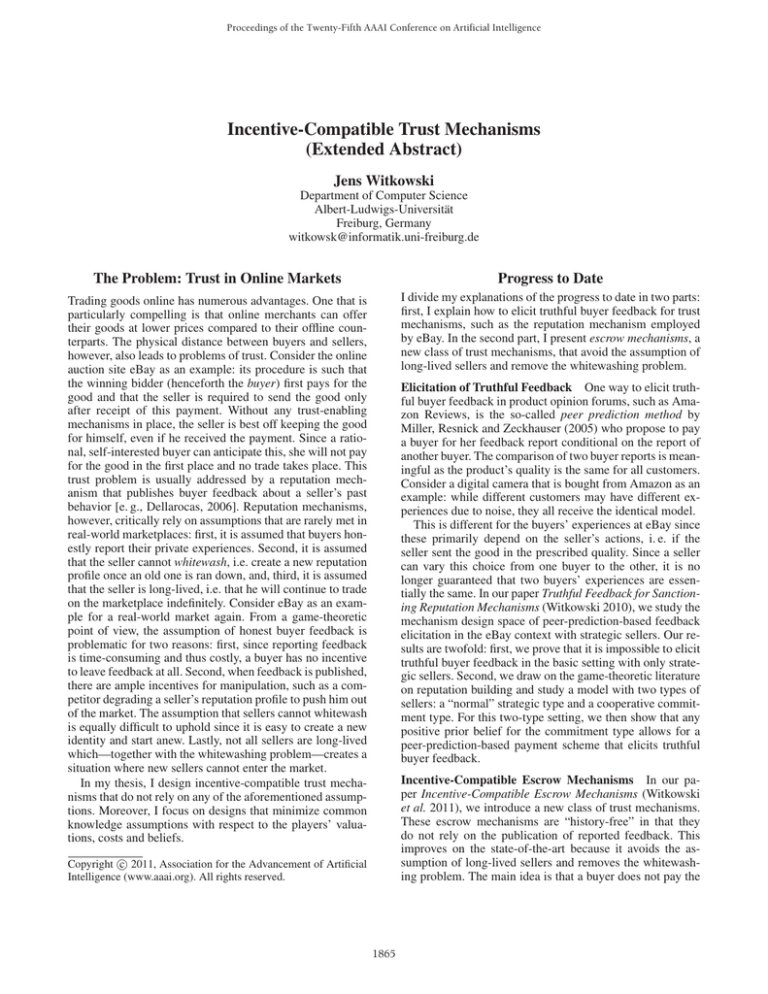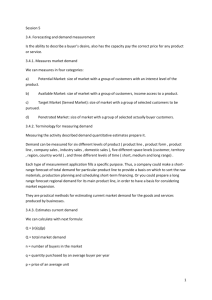
Proceedings of the Twenty-Fifth AAAI Conference on Artificial Intelligence
Incentive-Compatible Trust Mechanisms
(Extended Abstract)
Jens Witkowski
Department of Computer Science
Albert-Ludwigs-Universität
Freiburg, Germany
witkowsk@informatik.uni-freiburg.de
The Problem: Trust in Online Markets
Progress to Date
Trading goods online has numerous advantages. One that is
particularly compelling is that online merchants can offer
their goods at lower prices compared to their offline counterparts. The physical distance between buyers and sellers,
however, also leads to problems of trust. Consider the online
auction site eBay as an example: its procedure is such that
the winning bidder (henceforth the buyer) first pays for the
good and that the seller is required to send the good only
after receipt of this payment. Without any trust-enabling
mechanisms in place, the seller is best off keeping the good
for himself, even if he received the payment. Since a rational, self-interested buyer can anticipate this, she will not pay
for the good in the first place and no trade takes place. This
trust problem is usually addressed by a reputation mechanism that publishes buyer feedback about a seller’s past
behavior [e. g., Dellarocas, 2006]. Reputation mechanisms,
however, critically rely on assumptions that are rarely met in
real-world marketplaces: first, it is assumed that buyers honestly report their private experiences. Second, it is assumed
that the seller cannot whitewash, i.e. create a new reputation
profile once an old one is ran down, and, third, it is assumed
that the seller is long-lived, i.e. that he will continue to trade
on the marketplace indefinitely. Consider eBay as an example for a real-world market again. From a game-theoretic
point of view, the assumption of honest buyer feedback is
problematic for two reasons: first, since reporting feedback
is time-consuming and thus costly, a buyer has no incentive
to leave feedback at all. Second, when feedback is published,
there are ample incentives for manipulation, such as a competitor degrading a seller’s reputation profile to push him out
of the market. The assumption that sellers cannot whitewash
is equally difficult to uphold since it is easy to create a new
identity and start anew. Lastly, not all sellers are long-lived
which—together with the whitewashing problem—creates a
situation where new sellers cannot enter the market.
In my thesis, I design incentive-compatible trust mechanisms that do not rely on any of the aforementioned assumptions. Moreover, I focus on designs that minimize common
knowledge assumptions with respect to the players’ valuations, costs and beliefs.
I divide my explanations of the progress to date in two parts:
first, I explain how to elicit truthful buyer feedback for trust
mechanisms, such as the reputation mechanism employed
by eBay. In the second part, I present escrow mechanisms, a
new class of trust mechanisms, that avoid the assumption of
long-lived sellers and remove the whitewashing problem.
Elicitation of Truthful Feedback One way to elicit truthful buyer feedback in product opinion forums, such as Amazon Reviews, is the so-called peer prediction method by
Miller, Resnick and Zeckhauser (2005) who propose to pay
a buyer for her feedback report conditional on the report of
another buyer. The comparison of two buyer reports is meaningful as the product’s quality is the same for all customers.
Consider a digital camera that is bought from Amazon as an
example: while different customers may have different experiences due to noise, they all receive the identical model.
This is different for the buyers’ experiences at eBay since
these primarily depend on the seller’s actions, i. e. if the
seller sent the good in the prescribed quality. Since a seller
can vary this choice from one buyer to the other, it is no
longer guaranteed that two buyers’ experiences are essentially the same. In our paper Truthful Feedback for Sanctioning Reputation Mechanisms (Witkowski 2010), we study the
mechanism design space of peer-prediction-based feedback
elicitation in the eBay context with strategic sellers. Our results are twofold: first, we prove that it is impossible to elicit
truthful buyer feedback in the basic setting with only strategic sellers. Second, we draw on the game-theoretic literature
on reputation building and study a model with two types of
sellers: a “normal” strategic type and a cooperative commitment type. For this two-type setting, we then show that any
positive prior belief for the commitment type allows for a
peer-prediction-based payment scheme that elicits truthful
buyer feedback.
Incentive-Compatible Escrow Mechanisms In our paper Incentive-Compatible Escrow Mechanisms (Witkowski
et al. 2011), we introduce a new class of trust mechanisms.
These escrow mechanisms are “history-free” in that they
do not rely on the publication of reported feedback. This
improves on the state-of-the-art because it avoids the assumption of long-lived sellers and removes the whitewashing problem. The main idea is that a buyer does not pay the
c 2011, Association for the Advancement of Artificial
Copyright Intelligence (www.aaai.org). All rights reserved.
1865
seller directly but through a trusted third party (the center).
Once the seller has sent the good, the center asks the buyer
for her feedback report and forwards the payment to the
seller only if the buyer acknowledges the receipt of the good.
The key question is how to proceed with the withheld payments following a negative report. If the center reimbursed
every buyer who reports negatively, a rational buyer would
give a negative report even if she was satisfied. To avoid
this, our escrow mechanism matches two buyers and uses
the report of one buyer to determine whether the other buyer
receives a payback. We show that this mechanism is incentive compatible, efficient, interim individually rational and
ex ante budget balanced. We address collusion by matching
buyers from different sellers, so that, in large markets like
eBay, the chances for two colluders to be matched with one
another are very small. Consequently, the expected utility
for collusion is negative even under the assumption of minimal coordination costs. Moreover, and in contrast to previous work on trust and reputation, our approach does not rely
on knowing the sellers’ cost functions or the distribution of
buyer valuations.
These points directly correspond to probabilities but instead
of asking for probability reports, it allows buyers to interact
with the system in a way they are familiar with from other
online rating sites.
Incentive-Compatible Escrow Mechanisms The general
escrow mechanism technique is applicable to a wide class
of settings. A market that is particularly in need for a trust
mechanism is the crowdsourcing platform Amazon Mechanical Turk. On this platform, people are paid small rewards to
do human computation tasks, such as annotating images. A
particularity of this market is that the verification of a task,
i.e. to learn whether the task was duly completed, is costly.
At the same time, the fact that tasks are digital allows for an
external verification, i.e. the person who posted the task (the
requester) can ask others to verify it. It is therefore not uncommon that the verification of task is itself made a task. In
fact, for every original task, a requester usually creates two
verification tasks and asks other workers to vote if the original task was properly executed. Unfortunately, this scheme
does not properly incentivize effort, and fraudulent behavior
is a major problem. In future work, we will therefore develop
an escrow mechanism for this market that provides proper
incentives, and increases efficiency by reducing the number
of necessary verification tasks. In addition to escrowing the
payments, we incentivize verification workers by comparing their votes in a way that is similar to the peer prediction
method. Once we have designed the mechanism and proven
its theoretical properties, we will run an experiment with different designs on Amazon Turk itself. We are particularly
interested to study the optimal trade-off between the mechanism’s theoretical properties and the cognitive costs incurred
by the respective level of complexity.
Proposed Plan for Research
Until my graduation in May 2013, I will continue to work
on both the elicitation of truthful feedback and the design of
incentive-compatible escrow mechanisms.
Elicitation of Truthful Feedback A major drawback of
the peer prediction method are its strong common knowledge assumptions. Consider again a digital camera bought
from Amazon: the method’s first assumption is that every
buyer has the same prior belief about the camera’s true quality. For example, the buyers may believe that the camera is
of high quality with a probability of 70%. Second, once a
buyer receives the camera, she experiences a noisy signal of
its true quality and it is assumed that the probability for a
particular signal given a particular quality is the same for all
buyers. For example, the buyers may believe that they have
a positive experience with a probability of 90% and 30% if
the camera is of high and low quality, respectively.
These assumptions on beliefs entail two points: first, that
every buyer has identical beliefs and, second, that the mechanism knows them. In future work, we will design a mechanism that does not rely on either of these points. The basic
idea is to take advantage of the fact that right after ordering a good, the buyer cannot have experienced it yet which
allows the mechanism to ask for two probabilistic belief reports: one before the buyer receives the good and another
one after she has experienced it. By eliciting these two beliefs, the mechanism can infer the buyer’s experience as it is
reflected in the belief change: if the second belief report is
higher than the first, the experience must have been good and
vice versa. Please note that while the second belief is more
accurate, it is not sufficient to elicit only the second belief
report. The reason is that the inference of the buyer’s experience is required to condition the other buyers’ payments.
Also note that a property of this mechanism is that buyers
have to report probabilities. We will, however, “hide” them
and employ a user interface with a point scale from 0 to 10.
Acknowledgements
I want to thank my coauthors for inspiring collaboration. My
special thanks go to David Parkes for hosting me at Harvard
University, where most of this research agenda developed,
and my advisor Bernhard Nebel for his support and positive
attitude towards my plans and ideas. I am also grateful for
financial support through PhD fellowships from the Landesgraduiertenförderung Baden-Württemberg and the German
Academic Exchange Service.
References
Chrysanthos Dellarocas. Reputation Mechanisms. In Terry Hendershott, editor, Handbook on Information Systems and Economics.
Elsevier Publishing, 2006.
Nolan Miller, Paul Resnick, and Richard Zeckhauser. Eliciting Informative Feedback: The Peer-Prediction Method. Management
Science, 51(9):1359–1373, 2005.
Jens Witkowski, Sven Seuken, and David Parkes. IncentiveCompatible Escrow Mechanisms. In Proceedings of the 25th AAAI
Conference on Artificial Intelligence (AAAI’11), 2011.
Jens Witkowski. Eliciting Honest Reputation Feedback in a
Markov Setting. In Proceedings of the 21st International Joint
Conference on Artificial Intelligence (IJCAI’09), 2009.
Jens Witkowski. Truthful Feedback for Sanctioning Reputation
Mechanisms. In Proceedings of the 26th Conference on Uncertainty in Artificial Intelligence (UAI’10), 2010.
1866









